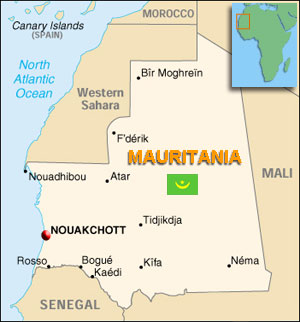|
|
MAURITANIA: The good guys of camouflage politics?
[ This report does not necessarily reflect the views of the United Nations]
|

|
NOUAKCHOTT, 8 Dec 2005 (IRIN) - Mauritania€™s military government that took power in a coup four months ago promised a new democratic era for the country and so far the new leaders appear to be sticking to their word.
While shaking hands with French president Jacques Chirac and meeting with elected African heads of state at regional conferences, junta chief Ely Ould Mohamed Vall is making it clear that he has no designs on power.
Indeed the coup leader, in an interview with the French daily Le Monde, espoused multiparty democracy.
€œThe single party system is without a safety valve. One is put in power 20 or 30 years and installed with the view of passing on that power to an heir apparent or offspring,€ Vall said last month.
Vall and his soldiers on 3 August ousted Maaouya Ould Taya, who ruled Mauritania for 21 years. A military takeover was hardly a surprise. Ould Taya was nearly toppled during a bloody uprising in June 2003 put down by loyalist forces only after two days of heavy fighting in the capital, Nouakchott. The following year Mauritanian authorities said they foiled at least two other coup plots.
In the immediate wake of the coup, Vall met staunch criticism from regional leaders and the international community at large. But from the start he has maintained that power would be handed over to an elected civilian government and last month the polling date was set for March 2007 €“ several months earlier than expected.
Already the junta has set up a 15-member national electoral commission €“ one of the steps emerging from October€™s broad-based consultations on Mauritania€™s democratic transition. At the commission€™s inauguration on 29 November Vall vowed it would be independent.
€œInstructions have been given to the entire administration to cooperate with them, to respect their liberty and their decision in a transparent manner,€ Vall said.
But some observers have their reservations.
€œThe authorities have made a lot of effort in public relations with lots of declarations, intentions and promises on paper as a first step,€ one diplomat told IRIN. €œWe must maintain pressure to get electoral lists drawn up. We don€™t know yet exactly what form the administrative census promised by the government will take.€
Practical questions of voting procedure also remained, the diplomat said, including the number of representatives that would be elected per district, how polls were going to be paid for -- not to mention the drafting of the 2006 budget.
€œThere is, too, uncertainty on the future of oil revenues, fishing agreements with the EU that are up for renegotiation in the summer and debt relief, which may or may not happen in 2006 €“ there are many unknown factors at the moment,€ the diplomatic source said.
Though resources are scant in the vast desert-land of Mauritania, the seas off its coast are rich in fish and petrol. Fish is the major source of foreign exchange and the country is expected to start pumping oil in early 2006.
While Mauritanian citizens greeted the August coup with cheers, some now say they want to see either a disassembly of the old party state, or at least a clearer demarcation of between the political class of the old regime and the new structures being put in place.
€œMauritanians applauded the departure of a mode, a method of management, a philosophy, a culture and not the departure of a person,€ said Mohamed Ould Haidalla, an outspoken critic of former president Ould Taya and an unsuccessful challenger in 2003 presidential elections that were widely condemned as flawed.
However, Haidalla expressed dissatisfaction that the former ruling party -- Democratic and Social Republican Party now renamed the Republican Party for Revival -- has not been held accountable for its two decades in power thus €œkeeping its halo intact€.
Critics of Ould Taya accused his government of tapping national funds for personal enrichment. But Vall has dismissed suggestions of investigating such charges.
€œWe would have to gather testimonies from all those who worked in the system for 20 years, from the orderlies to the ministers. We would need a century and a half to sort out this problem and I don€™t think it would ultimately benefit Mauritania,€ Vall has said several times, promising a clean operation from now on.
Neither is Vall willing to open the case of the forced exodus of some 65,000 black Mauritanians who fled deadly ethnic violence between 1989 and 1991. Some 20,000 remain in exile in Senegal, about 7,000 in Mali.
Human rights groups known for defiance under Ould Taya are also so far dissatisfied with Vall.
SOS-Esclaves, a local NGO working to end slavery in Mauritania, refused to attend talks with donors in Brussels because the new junta kept the issue of slavery off the agenda.
[ENDS]
| Theme(s) |
Democracy-Economy-Human Rights-Peace Security-Refugees IDPs |
 |
|
|
 |
|
 |
|
|






